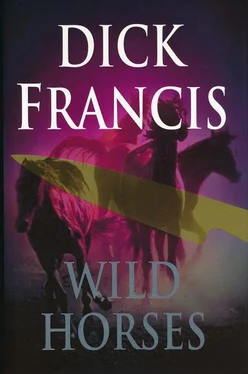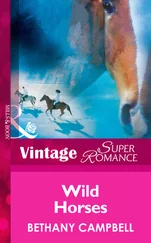I’d ridden as an amateur jockey in jump races from the age of sixteen, with most of my family expecting horses in some way to be my life for ever, but fate and finance — or lack of it — had found me at twenty engaged in organising horses in Arizona for the cavalry in a Western drama. By twenty-one I’d become the director of a bad minor film about rodeo riders, but that had led to the same post in a noble native-American saga that had modestly hit the jackpot. After that I’d spent a year working for film editors, learning their craft, followed by another year on sound tracks and music, and by twenty-six I’d been let loose as director on an unconsidered romance between a boy and a puma that had made astonishing profits. O’Hara had been the producer: I had never since been long out of work. ‘The boy’s lucky,’ O’Hara would say, selling my name. ‘You can’t buy luck. Trust me.’
For this present film I’d suggested to O’Hara early in the preproduction stage that this time we should buy , not rent or borrow for fees, our stableful of horses.
‘Too expensive,’ he’d objected automatically.
‘Not necessarily,’ I’d contradicted. ‘We can buy cheap horses. There are hundreds that have never done well in races, but they look like good thoroughbreds, and that’s what’s important. Also we won’t have any problems with insurance or recompense for injuries, we can travel them where and when we like, and we can work them without anxious owners fluttering round to fuss about their feed or exercise. We can sell them again, at the end.’
One of O’Hara’s chief virtues, in my eyes, was his ability to evaluate facts very fast and come up with quick decisions. So ‘Buy them,’ he said, and he’d liberated sufficient funds for a bloodstock agency to acquire the fourteen good-looking no-hopers currently eating oats and hay in our yard.
The actors’ unions having agreed we should use real-life stable personnel for the horses, I’d recruited a young assistant trainer from a prestigious Newmarket yard and installed him in charge of our whole horse operation, giving him the title of horsemaster and also the riding but non-speaking role of assistant trainer in the film.
He was already busy getting lads and horses ready for the morning action when I arrived in the yard at dawn. Moncrieff’s crew had laid felt carpeting over the gravel to silence the progress of the rolling camera dolly. He himself had strategically planted his lighting. Ed, he reported, was already in position upstairs.
The weather was cold and windy with dark scudding clouds. Moncrieff liked the moodiness, humming happily as he arranged for ominous shadows to fall across Nash’s stand-in, who looked hopelessly un-trainerlike in riding gear. When Nash himself — in character — strode out of the house and yelled bad-tempered instructions to the lads it was as real as any such bona fide moment I’d ever seen.
There were annoyances with the camera truck — one of its wheels squeaked despite the felt path. Oil and oaths fixed it. Moncrieff and I fretted at the delay because of light values. Nash seemed less irritated than resigned.
Only two takes were necessary of the assistant trainer giving Nash a leg-up onto his hack; the horse amazingly stood still. Nash wheeled away and sat on his mount in and out of shot while the assistant trainer heaved himself into his own saddle and led the circling string of by now mounted lads out through wide open stable gates onto the Newmarket training grounds beyond. Nash followed last, remembering to look back and up to the bedroom window. When his horse had walked him well out of sight I yelled ‘Cut’, and the whole string ambled back into the yard, the hooves scrunching on the gravel, the lads joshing each other like kids out of school.
‘How did it go?’ I asked Moncrieff. ‘Cameras OK?’
‘OK.’
‘Print, then.’ I walked among the horses to speak to their riders. ‘That was good,’ I said. ‘We’ll do it again, now, though. Two snaps are better than one.’
They nodded. By then they all considered themselves expert film-makers. The second take didn’t go as smoothly, but that didn’t necessarily matter: we would use the version that looked more natural on film.
I followed them on foot out of the gate to where Nash and all the lads were circling, awaiting my verdict.
‘Same again tomorrow morning,’ I said, patting horses’ necks. ‘Different clothes. Off you all go, then. Remember not to get in the way of any real racehorses. Walk and trot only on the grounds we’ve been allotted.’
The string filed off to exercise and Nash returned to the yard, dismounting and handing his reins to the lad left behind for the purpose.
‘Is it still on for tomorrow?’ he asked, turning in my direction.
‘Doncaster, do you mean?’
He nodded.
‘Of course it is,’ I said. ‘The stewards have asked you to their lunch, so you can use their box all afternoon and have as much or as little privacy as you want. They’ve sent tickets for two, for you to take a companion.’
‘Who?’
‘Whoever you like.’
‘You, then.’
‘ What? I meant a friend, or perhaps Silva?’ Silva was the bewitching actress he’d tumbled around with in bed.
‘Not her,’ he said vehemently. ‘You. Why not? And don’t say you’ll still be doing close shots in the enquiry room. Let’s make damned sure they all get completed this afternoon. I want you because you know the drill on a British racecourse, and the racing people know you .’
Green lights got what they wanted. Moreover, I discovered it was what I wanted also.
‘Fine, then,’ I said. ‘Helicopter at eleven-thirty.’
Watching his familiar back walk off to his ever-waiting Rolls, I called Bedford Lodge from my mobile phone and by persuasive perseverance got the staff to find Howard Tyler, who was in the bar.
‘Just a word, Howard,’ I said.
‘Not more script changes?’ He was acidly sarcastic.
‘No. Urn... simply a word of warning.’
‘I don’t need your words of warning.’
‘Good, then. But... er... I just thought I might remind you, knowing how you feel, that you agreed not to bellyache about the film until after its release.’
‘I’ll say what I damned well please.’
‘It’s your privilege. I don’t suppose you care about the penalties in your contract.’
‘What penalties?’
‘Most film contracts include them,’ I said. ‘I’m sure yours does. Film companies routinely seek ways to stop a disgruntled writer from sabotaging the whole film just because he or she dislikes the changes made to the original work. They put in clauses allowing themselves to recover substantial damages.’
After a lengthy pause Howard said, ‘I never signed such a contract.’
‘Fine, then, but you might check with your agent.’
‘You’re trying to frighten me!’ he complained.
‘I’m just suggesting you might want to be careful.’
Silence. Howard simply put down his receiver. So much for tactful advice!
True to his intention, Nash did make damned sure that we completed the enquiry room shots that day, even if not until past eight in the evening. In want of a shower and a reviving drink, I drove back to Bedford Lodge and found waiting for me a long fax from O’Hara, starting with the Daily Cable obituary.
Rupert Visborough’s life was dedicated to serving his country, the neighbourhood and the Sport of Kings.
Commissioned into the Scots Guards, he retired with the rank of major to enter local politics in his home county of Cambridgeshire. Many committees benefited from his expert chairmanship, including...
The list was long, virtuous and unexciting.
Читать дальше












